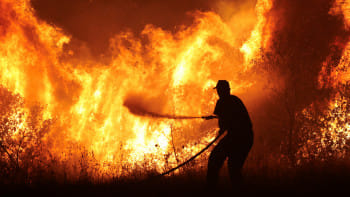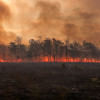More heatwaves, more deaths

As global temperatures continue to hit new records, heatwaves are getting deadlier by the day in Bangladesh, taking lives of the already vulnerable. In just four years, from 2017 to 2021, we lost around 1,430 people aged 65 and above due to heat-related health complications. This number, revealed by a recent study, is shocking as, just over a decade ago, the four-year death toll was less than half. How did we get here? That question is, unfortunately, not hard to answer, as we have witnessed what has gone wrong right before our eyes.
Extreme weather events like heatwaves, which have increased by 46 percent since 2000, are the result of climate change, which is a consequence of our ruthless zeal for economic growth at the expense of the environment. The study revealed that climate change has put the health of millions of Bangladeshis at risk. And among them, it is the young, elderly and marginalised who have to bear the brunt of this crisis.
Not everyone has the means to take refuge from the scorching sun. While many have the luxury of staying in air-conditioned spaces, others – day labourers, rickshaw-pullers and farmers, who have no choice but to work in this blazing heat – only have the shade of trees to rely on. Around the world, the lower-income population faced a 40 percent higher exposure to heatwaves than those with higher incomes. So, is it really a surprise that the poor succumb to heatwaves more?
Rampant, unregulated urbanisation is erasing greenery, which is essential to keep our surroundings cool. As the towers of concrete rise, the temperature follows suit. According to a study, just going outdoors may become deadly in many parts of Bangladesh by the end of the century. So, what can we do to prevent this disaster?
Besides the mammoth task of fighting climate change, the government must address the local problems. Cities are behind most of the global warming and climate change-related vulnerabilities, and so proper and climate-friendly urban planning is essential. This entails more trees, robust public transport to limit carbon emissions, and buildings with natural shading and ventilation. Ultimately, egalitarian cities will ensure that everyone, regardless of their health and income level, can find shelter from the sun.
Follow The Daily Star Opinion on Facebook for the latest opinions, commentaries and analyses by experts and professionals. To contribute your article or letter to The Daily Star Opinion, see our guidelines for submission.

 For all latest news, follow The Daily Star's Google News channel.
For all latest news, follow The Daily Star's Google News channel. 










Comments